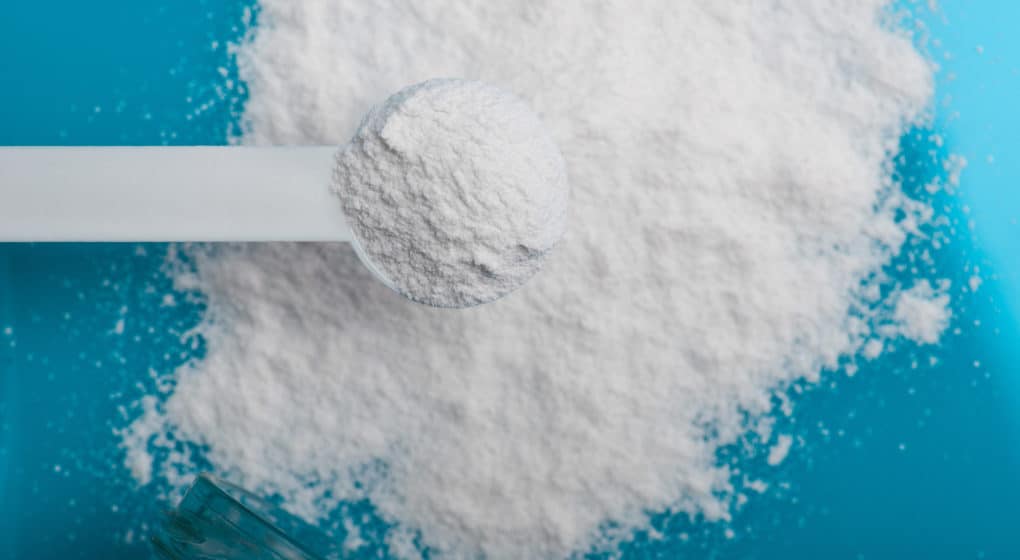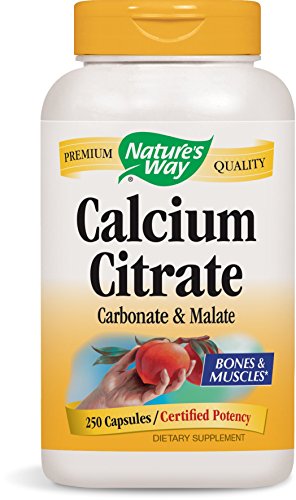
For the body to function effectively it requires having adequate nutrients available at all times. These nutrients (with a rather specific emphasis on vitamins and minerals) are used to produce a number of the body’s tissues, while also playing key roles within a number of cellular processes.

- Fantastic option
- Most popular
- 1000mg per serve

- Incredible reputation
- Great quality
- Affordable price

- Quite unique
- Great option
- Potent dosage
Now if we happen to become deficient in any one of these nutrients, we will see rapid declines in health and function as a result.
With this in mind, the supplementation of these essential vitamins and minerals typically provides an exceptional means of ensuring that the body and its health is maintained at all times.
Interestingly, there is evidence to suggest that supplementing with some of these specific compounds can also elicit additional health benefits – with calcium citrate being a prime example of this.
What is Calcium Citrate?
Calcium itself is a mineral that is naturally found in the earth. This amazing compound is actually considered a metal, and as a result, contains a positive ion. These ions are used within the body to help transfer messages throughout the nervous system and the brain.
As a result, calcium is thought to be integral to maintaining a high level of nervous system and cognitive function.
Additionally, calcium is also a key component of our hair, nails, and bones. With this in mind, it is absolutely essential to the health of these key tissues.
So, in the simplest sense, calcium citrate is a specific form of calcium supplement that comes from citric acid. Considering this, calcium citrate is an excellent supplement because your body best absorbs calcium in an acidic environment – and as calcium citrate is already an acidic molecule, it is absorbed into the body very readily.
What are the Benefits of Calcium Citrate?
As calcium has been shown to play so many important roles throughout the human body, it stands to reason that the supplementation of calcium citrate is likely to have some seriously positive effects on health and function – so we have taken an objective look at the research to determine where it offers us the most benefit.
Does Calcium Citrate Help With Osteoporosis?
As we have already touched on briefly, calcium is an essential component of bone tissue. With this in mind, having it readily available within the body is absolutely integral to ensuring that bone mineral density is maintained throughout your lifetime.
Building on this notion a little further, the regular supplementation of calcium has been shown to actually elicit increases in bone density. This suggests that calcium citrate offers not only a means to prevent osteoporosis, but can also act as an additional osteoporosis treatment option.
Can Calcium Citrate Reduce Cancer Risk?
In conjunction with its impact on bone health, there is also some preliminary research demonstrating that low levels of calcium within the body are associated with an increased risk of developing colon cancer.
While this research is unquestionably within its early stages, it does suggest that calcium citrate supplementation may play a key role in maintaining cell health, which may therefore reduce cancer risk.
It is important to note that the association between calcium intake and other forms of cancer are yet to be explored in depth.
Does Calcium Citrate Lower Blood Pressure?
Calcium has also been shown to play a role in the maintenance of normal cardiovascular health and function, with low calcium consumption shown to have extremely strong associations with heightened blood pressure.
With this in mind, supplementing with a high-quality calcium citrate supplement does have the ability to lower measures of both systolic and diastolic blood pressure, thus enhancing cardiovascular and heart health.
Can Calcium Citrate Help with Weight Loss?
There is some very interesting research demonstrating that calcium can impact both fat metabolism and digestive health. Considering this, undertaking a weight loss regime in conjunction with calcium supplementation has been shown to promote more fat loss than simply using a weight loss routine alone.
This suggest that calcium citrate may offer the perfect addition to your diet and exercise regime if your primary goal is to lose fat.
Can Calcium Citrate Enhance Brain Health?
And finally, in conjunction with all of the above, research has also shown that supplementing with calcium citrate can even improve memory and help fight against Alzheimer’s disease and other age-related declines in cognitive function.
While the exact mechanism behind this remains unclear, it has been suggested that as calcium plays an integral role in nervous system function, its supplementation can therefore assist in keeping these important tissues healthy – and thus functioning to a high level.
Best Calcium Citrate Product Reviews
As supplementing with calcium citrate appears to have some incredibly positive effects on the human body, we wanted to give you some great option that you can begin to use immediately.

- Fantastic option
- Most popular
- 1000mg per serve

- Incredible reputation
- Great quality
- Affordable price

- Quite unique
- Great option
- Potent dosage
This fantastic option by Solaray is one of the most popular on the market at the moment – and really, this should not come as a surprise.
Providing a potent dosage of 1000mg calcium citrate per serve, this is an excellent product at a very good price point.
Natures Way have built an incredible reputation for consistently bringing out great quality products at very affordable price points – and fortunately for us, their calcium citrate supplement is no different.
Using a scientifically supported dose of 500mg per serve, this is a great choice for those looking to boost health easily and effectively.
Our final option by NOW is quite unique, as not only does it provide a potent dosage of 600mg of calcium citrate per serve, but it also contains the key compounds Magnesium, vitamin D2, and Manganese – all of which have been shown to enhance bone health considerably.
As a result, this is a great option for those who want to take calcium for its positive effects on osteoporosis specifically.
Calcium Citrate vs. Calcium Carbonate
Now, some people reading this may be wondering why Calcium citrate specifically – especially considering Calcium Carbonate is often a much cheaper alternative?
Now it is important to note that this particular form of calcium is actually found in many common brands of anti-acid tablets. This is because it is much more affordable to produce tan calcium citrate – but this also makes it much less effective,
You see, unlike citrate, carbonate is alkaline, and subsequently requires additional stomach acid to both digest and absorb it. As a result, it actually needs to be take with food, and cannot be taken on an empty stomach.
In terms of calcium per serve, calcium citrate and calcium carbonate are very similar – however, calcium citrate is a much more efficient option as it can be taken on an empty stomach and is easily absorbed into the body.
Calcium Citrate Liquid vs. Powder vs. Chews
And finally, it is also important to distinguish that calcium citrate can also come in three key forms. These include as a liquid, as a powder, and as a chew.
Now, for the most part, these supplements are extremely similar. The provide the same form of calcium citrate in very similar dosages, and therefore have the potential to have the same impact on health.
However, if you have some sort of digestive disease, liquid and chew-based supplements may actually be your best options. While these are rationally more expensive than simple capsules, they are both much more readily absorbed into the body, while requiring minimal processing within the digestive system.
This makes them perfect for those individuals who suffer from irritable bowel syndrome, as they cause minimal irritation to the digestive lining. Additionally, this also means that they are likely to be much more effective in elderly individuals who struggle to break down and digest capsule-based supplements in any manner.
Now for those individuals who do not suffer from any digestive issues, calcium citrate supplements are questionary your most cost-effective option.
Conclusion
Calcium is a mineral that is integral to the health and function of the human body in its entirety. Considering this, the supplementation of calcium citrate has been shown to improve bone density and cognitive function, lower blood pressure, reduce cancer risk, and even enhance weight loss.
If you are looking for a supplement that offers a heap of bang for your buck, then its hard to look past calcium citrate.
As always, if you have had any experience using calcium citrate then we would love to hear about it, so drop us a comment and we will get back to you ASAP!
References
- Hirsch, Calvin. “ACP Journal Club. Review: Dietary or supplemental calcium increase BMD by≤ 1.8% in persons> 50 years of age.” Annals of internal medicine2 (2016): JC5. From:
https://www.ncbi.nlm.nih.gov/pubmed/26784495” target=”_blank” rel=”noopener”>https://www.ncbi.nlm.nih.gov/pubmed/26784495 - Han, Changwoo, et al. “Dietary calcium intake and the risk of colorectal cancer: a case control study.” BMC cancer1 (2015): 966. From:
https://www.ncbi.nlm.nih.gov/pubmed/26675033” target=”_blank” rel=”noopener”>https://www.ncbi.nlm.nih.gov/pubmed/26675033 - Cormick, Gabriela, et al. “Calcium supplementation for prevention of primary hypertension.” The Cochrane Library (2015). From:
https://www.ncbi.nlm.nih.gov/pubmed/26126003” target=”_blank” rel=”noopener”>https://www.ncbi.nlm.nih.gov/pubmed/26126003 - Tremblay, Angelo, and Jo-Anne Gilbert. “Human obesity: is insufficient calcium/dairy intake part of the problem?.” Journal of the American College of Nutritionsup5 (2011): 449S-453S. From:
https://www.ncbi.nlm.nih.gov/pubmed/22081691” target=”_blank” rel=”noopener”>https://www.ncbi.nlm.nih.gov/pubmed/22081691 - Heck, Angela, et al. “Genetic analysis of association between calcium signaling and hippocampal activation, memory performance in the young and old, and risk for sporadic Alzheimer disease.” JAMA psychiatry10 (2015): 1029-1036. From:
https://www.ncbi.nlm.nih.gov/pubmed/26332608” target=”_blank” rel=”noopener”>https://www.ncbi.nlm.nih.gov/pubmed/26332608



